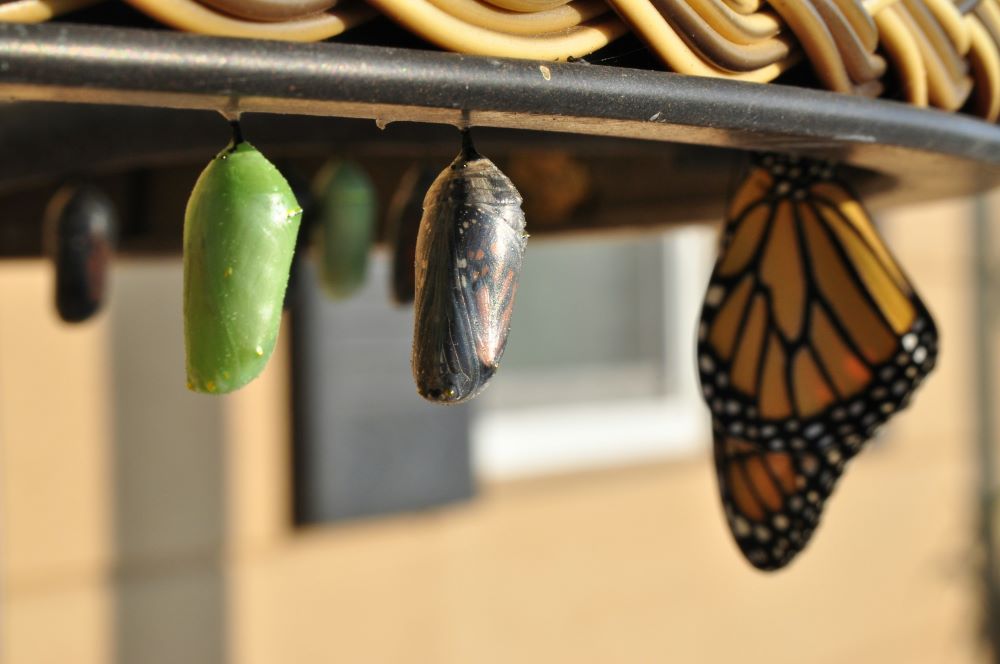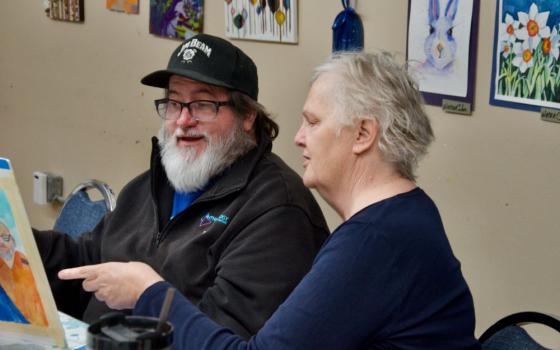
(Unsplash/Suzanne D. Williams)
Now that we have a basic understanding of the evolution of religious life from what Robert Kegan calls in The Evolving Self an institutional to an interindividual stage of development, we can take a closer look at some of our vocational experiences. We can also explore how we might lean into the challenges of our evolution.
Back in the novitiate, we were told to strive for perfection. We were also told to regard virtue as consisting of balancing opposites rather than favoring one polarity over the other. Virtue lay in "the middle of the road."
This sounded good, but we were inexperienced in integrating the two principles. In our initial fervor to reach perfection, for instance, we may have fasted to the detriment of our health. As a result, we suffered social, cognitive, emotional — and even spiritual — impairment.
Fortunately, Scripture scholars and post-novitiate spiritual directors enlightened us by telling us that Jesus was remarkably virtuous but not perfect. For example, when in Matthew 15:27 he compared a Canaanite woman to a dog, he exhibited prejudicial thinking and behavior not uncommon in his first-century Jewish culture.
Thus, we had to accept the fact that living out our vows and charisms would never free us from our humanity. We would not become paradigms of virtue. We had to own our limitations and imperfections. Conversion was an ongoing process — not an outcome. Sufi master Hafiz's claim that "there is nothing but divine movement in this world" had to be put in the context of simultaneous and strikingly inferior human movement, especially when in the realm of spirituality.
We also had to accept that because "privileges (e.g. having authority) are always enjoyed under a cloud, leaders will sometimes misuse their power." Furthermore, all primates — including women religious — sometimes fall back into selfishness and unkindness as they compete for scarce resources. And because all forms of life, wrote Frans de Waal in The Age of Empathy: Nature's Lessons for a Kinder Society, "are all for fair play as long as it helps [them]." Sisters could hope that others would meet their expectations but had to remember that others would continue to prefer their way of doing things because, as de Waal adds, the “chief emotions [we have are] ego-centric.”
We had to accept the fact that living out our vows and charisms would never free us from our humanity. We would not become paradigms of virtue. We had to own our limitations and imperfections.
Moreover, we had to learn new ways of becoming virtuous to get results "good enough for government work." Praying and embellishing our relational skills were still usable. But advanced sociopsychological theory and research identified additional aspects of truly viable communal life. One was that all community members had to participate for them to resolve communal conflicts, beginning with self-disclosure.
In addition, it was unrealistic to think that candid, honest self-disclosure was possible without trust. We were naïve if we thought we could share our perceptions and emotions indiscriminately. We could do so safely only with those we had experienced — and continued to experience — as trustworthy. Sisters who disclosed confidential information to third parties, even if they said something like, "This is just between us," did not pass muster. They were not deserving of our self-disclosure. Neither were we if we betrayed them. And in fact, few of us could claim we didn't.
Why? We are women. We are significantly more verbal than men, notwithstanding the expected bell curve in a large group. We are also more sensitive to emotional pain: more empathic and more sympathetic. We desire to respond benevolently to those in pain. As de Waal says, we are prone to do so by communicating. We talk by using language along with "talking" through body movement and body language, including tone of voice, inflection and volume.
To make the matter even more complex, we unconsciously enact untreated trauma: our own and our ancestors. Our very DNA, de Waal explains, programs us to do this. "Neural circuits [connected with communicating] … get reactivated automatically." Despite trying not to, we inevitably reveal who we are and how we feel about each other. Evolution has seen to it! For “evolution rarely throws out anything,” de Waal says, knowing that it can be adapted to changing circumstances. The fins of fish, for example, could and did become the arms of rodents.
But back to the primacy of trust. Candid self-disclosure and working with diverse perspectives are irreplaceable elements of consensus building, which is foundational to conflict resolution. However, trust is even more foundational. And not having it or losing it is a major obstacle to the formation of life-giving communities. And it is not easily rebuilt, even with the best of intentions and repeated efforts.
Advertisement
Why? Because, as evolutionary research reveals, the human brain — indeed even the animal brain and plant "brain" — cannot subtract. A brain can only add.
Furthermore, our most recent evidence-based methods for dealing with trauma memories, like eye movement desensitization and reprocessing and depth-oriented brief therapy, greatly reduce — even appear to erase — our psychological pain. But when we experience certain triggers, trauma memories resurface. Furthermore, trauma memories can be inherited from ancestors. Evolution has seen to it!
That is the bad news. The good news is that "what drives evolution is separate from what drives behavior," de Waal explains. “We are free to use [our tendencies and habits]…any way we want."
And God, again through wonderfully designed evolutionary processes, has given us traits that are rich and varied. Some, like our ability to put ourselves into each other's position and respond with concern, "play out against a background of competition," and our need to survive as individuals and groups. This, of course, dovetails nicely with the wisdom of embracing the interindividual stage of development in that it combines being in relationship with being true to ourselves. It is balanced.
Thus, sisters in the interindividual stage neither sacrifice themselves totally for the community nor allow their communities to become silos of self-centered individuals. They define "win-win" as something they can live with, if not be in agreement with.
They acknowledge that a sister's physical endurance will trump her capacity to participate in communal life. Being sick will inevitably change her perception of herself and others. "The same hill is assessed as steeper, just from looking at it, by a tired person than by a well-rested one," de Waal notes. Evolution has seen to it!
Finally, religious life seems to be evolving so greatly that we can hardly identify it with the way it once was. But that is all right. We need not be afraid or troubled, as Jesus puts it in Matthew 28:10. We can accept His post-resurrection gift of peace, knowing that evolutionary development is at the heart of our Creator's plan.





